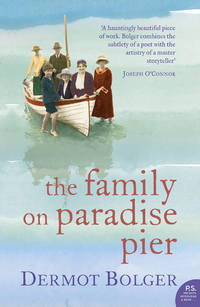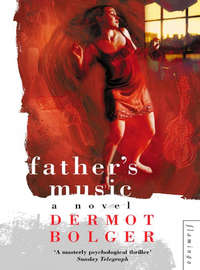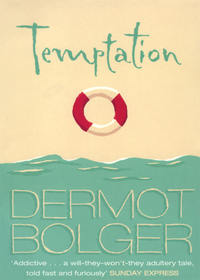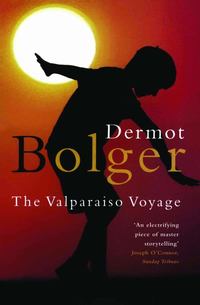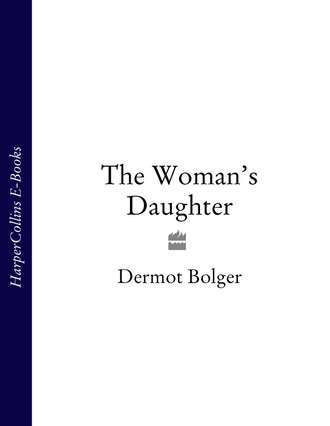
Полная версия
The Woman’s Daughter
We gave three cheers for the nun and three cheers for Miss O’Flynn, and presented her with a box of milk chocolates that she shared out amongst us. The nun led us in a final prayer and reminded us that faith was the most precious gift we would ever receive before opening the door for us to file out into the summer light.
For the last time I walked up those steps with Kitty Murphy, our arms entwined, and we imagined ourselves in just a few years standing at the gates of this very school, leading our own children down to enrol, and how we’d laugh about old times with the familiar figures smiling in their black hoods. We paused at the corner to embrace and moved off like blood sisters with the wetness of her tears mingling into my own as they rolled slowly down my cheeks.
The smell of lacquer always clung to her clothes and hands even though she scrubbed them for hours each night. In the hot stifled atmosphere of the salon she brushes up the piles of shorn hair from the floor to be packed into boxes and sold to wig manufacturers. She trains her hand to be steady as she pours the cheap lotions into expensive jars for resale, and her feet ache as she runs from chair to chair, setting out clean towels and combs while the customers gaze at magazines from beneath the whirling dryers.
Autumn sunlight flashes against the windows of the buses in the street below the cramped rooms where meekly she obeys the commands of every member of the staff who, on her one half-hour break in the day, introduce her to the alien taste of coffee and allow her to marvel at the colour pictures in the pile of English women’s magazines.
Of course, I gave my wages every week to Daddy and from it he’d give me pocket money. In the evenings after work I could go walking in the street because I was free from homework. The films in the Casino were now becoming over-sixteens and I loved to watch the couples queuing there for the evening show.
It was only a matter of time before a boy would come along and at first, I’d be coy but finally I’d agree. He’d pay us into the 2/6d seats where I would let him take my hand, and afterwards he’d offer to walk me home and we’d take the dark side of the main road, over beside the stream and the trees on the bank, and he’d hold me against a trunk to press his lips on to mine.
After a few minutes I’d protest and he would stand back to apologize. I would give him my hand as we’d step again on to the path and when he left me at the gate, I would rush into the dark sitting-room to watch him standing across the street maintaining a lonely vigil beneath the lamp-post.
I’d go to bed, and all those memories of Johnny would be banished as I’d fall asleep dreaming of that young man out there waiting for me. But no boy ever asked and I’d never have been allowed to be seen on the street in such company. The door would be locked on me at nine o’clock and no amount of pleading would get me back in.
Acne and bristles and cigarettes. Johnny rarely stays at home now. Each evening he merges into a gang of mates, shouting from the open platforms of dark green buses. In the Astor, they wolf-whistle Brigitte Bardot in A Very Private Affair. In the Bohemian, Rock Around the Clock is being revived. They spend hours sharpening the tips of steel combs to rip out the seats during the theme song.
In the twisting streets around Stonybatter, small pubs welcome the scrum of under-age boys. At weekends they spend most of their wages there and queue in the greasy fish and chip shops of Phibsborough before strutting the two miles out by the cemetery with catcalls at the couples walking home from dances. They piss in front gardens, ring doorbells and empty dustbins along the main road. She hears him come in at two o’clock in the morning and waits for the light switch to click off in her father’s room.
On Friday nights, voices are raised in the kitchen as he demands Johnny’s wage packet, and when Johnny has stormed out, slamming the front door, her father comes in to her with his face white in the first shock of defeat. They sit in the chairs on both sides of the fire with only the flames and the red lamp in the corner to light the room, and listen to the voices on Radio Eireann, the farming reports, and whine of accordions and asthmatic tin whistles in strict and monotonous three-four time filling up the silent room.
They let me go in the hairdressing salon after the six months when they had promised to make me permanent. I stayed at home for two days while Daddy made enquiries. On the third night, he told me to report the next morning to the drapery shop in the village.
I was six months there behind a counter piled with patterns and balls of wool, when a letter came in my name calling me for interview to the new shirt factory below the village. He had never told me he had even applied. I was taken on with a hundred and twenty others.
The plant was brand new, everything so spick and span, and there were loads of girls just turned fifteen like myself. They let us play the radio all day as we sat at the machines and the older women came round with baskets to collect the finished garments. The Beatles were coming to Dublin and there was such excitement in work you couldn’t imagine. Two of the girls had tickets and walked around like queens, while the rest of us arranged to meet up and stand outside the Adelphi to try and catch a glimpse of them.
There were thousands there, pushing and milling, and then as the first show came out, the fighting began. The girls behind me started pulling my hair to get up nearer and the police charged down Abbey Street after the gangs of boys. I fell in the crush and cut my knee open. A policeman pushed the people back and lifted me out as I put my arms around his neck and clung to him in terror. They brought me home in a squad car, crammed with other girls who’d been hurt.
All the way home I prayed Daddy would be out, but he came to the door when the car pulled up. He looked so slight and feeble there with shame in his eyes as if the world was slipping away from him. He grabbed me by the hair in the garden and pulled me inside until he was pressed right up against me in the hallway. I could feel his breath as he raised his hand and I cowered, waiting for the slap to come down across my face. Instead, he just lowered it again and shook his head.
‘I’ll lock you in that room upstairs,’ he said, ‘till you learn not to disgrace me.’ And he grabbed hold of my coat and pushed me ahead of him up the stairs. I was sobbing and tried to put my arms round him but he just shoved me on to the bed in this room and unscrewed the light bulb. He locked the door and left me sitting in the darkness. It was a Friday evening. From the window I could see the young people coming home from the pictures in groups, singing and enjoying the last drags of cigarettes before they reached their houses. And later on, the couples from the dances, on scooters or on foot, quiet now and anxious to avoid notice, standing against the dark leaves of the bushes fronting Mrs Finnegan’s house with their arms around each other and only their mouths moving.
Johnny came in and I waited, hearing him ask where I was. I could hear their voices raised in argument, followed by the sitting-room door slamming. Then my father’s feet came, one step, two step, like the old bogeyman. Was he coming to forgive me? Was he coming with his belt to beat me? The steps went into his bedroom and I heard the door close. There was complete silence in the house, yet I knew none of us were asleep. All night I kept waiting for Johnny to come. I’d say to myself, he’s waiting for Daddy to cool down, in another ten minutes he’ll climb the stairs. Or he’s searching in the kitchen for the spare key, any minute now he’ll come for me.
The darkness in the room was unbearable because I could not control it. I kept on imagining all kinds of things; my mother was sitting by the door in a chair, the furniture was swaying in the dark around me, floorboards were creaking on the landing. But nothing happened and nobody came, until finally towards dawn I fell asleep from exhaustion.
‘I’ll dream of them tonight,’ said the small, fat fifteen-year-old girl whose eyes were shining and forehead damp as she tottered out into O’Connell Street like somebody possessed.
There was a tiny man with a red nose and spectacles standing on a wooden box outside the Evening Press offices preaching about salvation. But he was talking to himself. Outside the cinema, a row of stout policemen with their arms linked were heaving strenuously against a frantic sea of young people. Girls were screaming inside. They screamed at the pictures in the programmes or if somebody shouted ‘Beatles!’ The atmosphere was hot and sharp: full of power and perfume and a frightening excitement.
But when the curtain finally rose on THEM, the house erupted into one mad, thunderous noise, that continued right until the cries for more were drowned by the National Anthem.
This morning it was ‘B’-Day plus one as the city began to clean up the debris from the Beatles invasion. Motorists made their way through the shambles of Abbey Street, while workers replaced the plate glass windows which fell victim to teenage hysteria.
Trouble began after the first of the two shows when more than two thousand people leaving the cinema ‘mingled’ with those going in. Members of the St John Ambulance Brigade attended to injured people on the spot while crowds ran riot around them.
Said a Garda sergeant whose cap was knocked off by a flying object, ‘I have seen everything now. This is really mad. What can have got into them? You would imagine the country was in the middle of a revolution instead of welcoming four fugitives from a barber’s shop.’
On the Saturday morning I knocked, but Johnny had gone away to town. I could hear Daddy in the room below silently pacing. I kept crying out for food and water until he finally appeared. He left the tea and sandwiches on the dresser and never once spoke. I wished to God he would scream at me or beat me black and blue, but he punished me instead with his silence.
I had had to pee in an old vase of my mother’s that I was afraid to show him. By seven o’clock every muscle of my body was tense, my nails were bitten through, my head was drumming. I felt like the man in the paper who had been buried alive. I began to shriek like an animal and hurl myself against the door and that is where Johnny discovered me.
This is the bit the girl knows by heart. Where Johnny discovered me. These are the words she will say to herself in the long afternoons when the woman is working. Sitting in the chair watching over the bed where her nightdress is stretched on top of the sheets. She leans her head forward every time the story reaches here and gazes at the woman’s lips.
Johnny came home at nine o’clock and when my father wouldn’t give him the key, he went upstairs and kicked the door in. He found me lying in a pool of urine with blood crusted on my forehead. He carried me into the bathroom and locked the door, then filled the tub and sponged me down. I remember that his hands moved with a gentleness I had not thought him capable of. It was the first time he’d touched me in over two years.
He pulled a clean nightdress over my head and laid me back gently in my bed. Though I was groggy and only half-aware, I could feel a tremor in his hands as he drew the blankets over me and whispered, ‘Don’t worry, sis, I’ll look after you. I’ll never leave you alone with him again.’
Then he closed the door and marched down to confront my father standing defeated in the kitchen.
The girl lies back against the wall, her limbs stretched out, her breath coming quicker. But the woman stares at the floor as if by now only talking to herself.
That night he came again to my room, but more hesitant and shy than when we were young. He drew the blankets back slowly and waited to see if I would complain. His body was stronger than before, so that in the darkness he felt like a grown man. And I clung to him and allowed his hands to wander wherever they wanted to over me. His fingers found me and I sucked in my breath as he rubbed them back and forth.
I was nervous now and frightened but yet I didn’t want him to stop even though I knew that it was wrong. My hands performed all the old tricks that he had taught me when I was ten. But I was fifteen now and knew there were no guardian angels to be excluded or wronged. He panted beside me so loudly I had to cover his mouth and then he lay flat like a dead weight against my side. And all he said was ‘I’m sorry, sis,’ over and over again.
The Casino cinema was taken over by the new supermarket and there was nothing left in the evening except the bus to town. Shoppers queuing at the meat counter could gaze up to the old balcony at trainee managers stacking cardboard boxes where suspicious ushers had once trained their torches.
Workmen began to fell the wood to build a dual carriageway that would slice the village in half. She watched the trees fall, every one of which seemed to contain a memory. A picnic of children sharing gur-cake and water, autumn afternoons with Johnny searching for conkers, the trunk her lover would have held her against. Blue tar was spilt and rolled into shape and, like a token replacement, tiny shoots of trees planted that the local youths smashed in disgust. Only the rivulet survived, swirling unnoticed through its narrow gorge.
The children of the estate were growing up and finding jobs or waiting at bus stops with two cases for the boat train. All the way to London, the train’s wheels chanting you’ll never go back, you’ll never go back. New estates were springing up in the fields where she used to walk. Lorries loaded down with furniture moved along the finished side of the carriageway.
Two weeks after the Beatles came I arrived home to find Daddy in tears. There was no light on in the dining-room where he sat alone and I know that he had been there for hours, staring down at the wedding photograph in his hand as the features were gradually obliterated by the darkness. He turned to me in bafflement, and said, ‘President Kennedy has been shot. Has the whole world gone crazy or what?’
I wanted to put my hand out to him as he passed but I was no longer able to. He leaned heavily on the banisters when he went slowly to his room. After that, he rarely spoke to us, as if all his pride and hope was gone.
We had the house to ourselves and could do what we liked. Johnny and I bought a record-player between us and his friends called now to the sitting-room to play cards and listen to music. I’d come in with big pots of tea and toast for them and fall in love with each in turn, and they’d always shout down to me in the kitchen on their way out where I read romance magazines alone.
I had new friends in the shirt factory and we laughed and chatted to each other among the clattering machines. At lunch-time we’d sit out on the steps and wave back at the lads unloading the vans. Every Friday night, we’d gather at the bus stop to go to the pictures or dancing. I’d soak for half an hour in the bath and use the Lady Manhattan talc I’d splashed out five bob for.
The Friday evening bus to town. They occupy the back seat on top: eight of them squashed against the blue leather, five with beehive hairstyles, one looking like Priscilla Lane. Frames of evening sunlight flicker between the houses. One girl is laughing hysterically, inhaling noisy gulps of air as though she were choking. Whenever she falters, another begins and then another, each setting the other off, with the original joke long forgotten. The boys in the top seats cast slick glances back at them and shout down the aisle.
Конец ознакомительного фрагмента.
Текст предоставлен ООО «ЛитРес».
Прочитайте эту книгу целиком, купив полную легальную версию на ЛитРес.
Безопасно оплатить книгу можно банковской картой Visa, MasterCard, Maestro, со счета мобильного телефона, с платежного терминала, в салоне МТС или Связной, через PayPal, WebMoney, Яндекс.Деньги, QIWI Кошелек, бонусными картами или другим удобным Вам способом.


